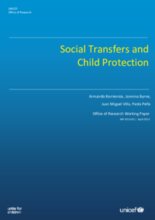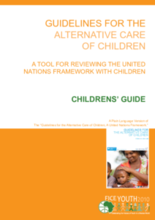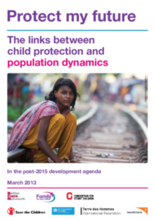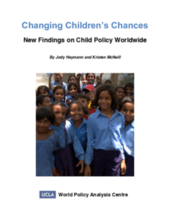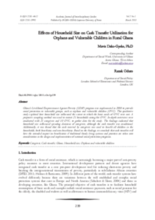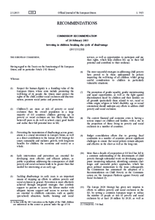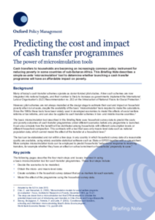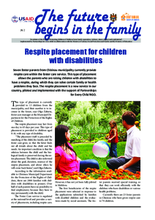Displaying 251 - 260 of 454
The primary goal of this research was to examine whether Malawi Social Cash Transfer Pilot Scheme, initially implemented in a rural district in central Malawi, improved health outcomes for children aged 6–17.
This study, published by the UNICEF Office of Research and Brooks World Poverty Institute, examines the direct, indirect, and implementation impacts of social transfers on child protection outcomes in low- and middle-income countries. The paper discusses the ways in which social transfers can promote the welfare of children by preventing violence, abuse, and exploitation of children and offers recommendations for future research, programming, and practice.
This booklet from SOS Children’s Villages International was created for young people to explain in a simple manner the main points of the Guidelines for the Alternative Care of Children approved by the United Nations General Assembly in 2009. The booklet helps its young audience think about the principles of alternative care and what these mean for children and families in different situations.
This paper is part of an inter-agency series on the links between child protection and major development goals. The report focuses on the links between child protection and population dynamics as they relate to the post-2015 Millennium Development Goals agenda.
This new report by the World Policy Analysis brings together key findings from the book, Children’s Chances: How Countries Can Move From Surviving and Thriving, providing a global picture of what laws, policies, and programs countries have in place to address areas vital to children’s healthy development.
This qualitative study explored how household size influenced the extent to which the basic needs of orphans and vulnerable children were met through the Livelihood Empowerment Against Poverty (LEAP) program in Ghana.
This Recommendation by the European Commission on Investing in Children, stresses the importance of early intervention and preventative approaches, and makes quality childcare one of its key policy areas to break the cycle of disadvantage in early years and reduce the risk of child poverty and social exclusion.
Cash transfers to households are becoming an increasingly common policy instrument for reducing poverty in some countries of sub-Saharan Africa. This Briefing Note describes a simple ex-ante ‘microsimulation’ tool to determine whether launching a cash transfer programme will have an affordable impact on poverty.
This 10-page newsletter, translated into English, is issue number two of a series produced by the “Protecting children of Moldova from family separation, violence, abuse, neglect and exploitation” project, which is implemented by Partnerships for Every Child, the Ministry of Labour, Social Protection and Family of Moldova, and the Ministry of Education of Moldova.
This newsletter, translated into English, is the first of three issues produced by the “Protecting children of Moldova from family separation, violence, abuse, neglect and exploitation” project, which is implemented by Partnerships for Every Child, the Ministry of Labour, Social Protection and Family of Moldova, and the Ministry of Education of Moldova.

